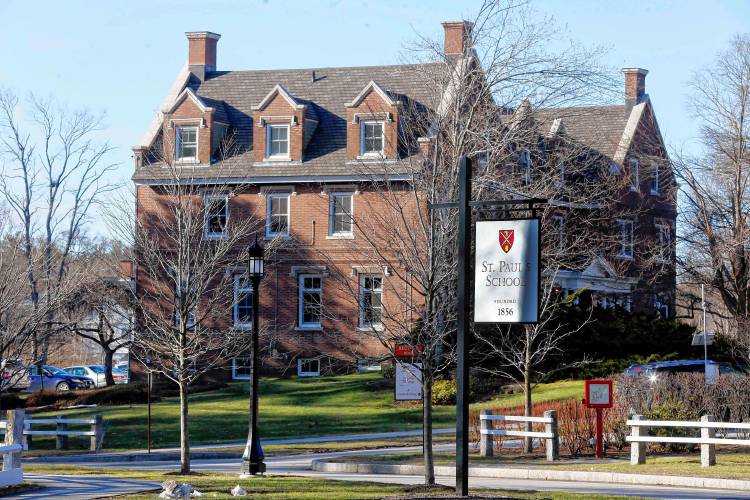New squash courts in the works at St. Paul’s

This Feb. 26, 2016, file photo shows the entrance to St. Paul’s School in Concord. AP
| Published: 11-07-2024 7:00 PM |
One hundred and forty years after it built the first squash courts in the United States, St. Paul’s School is planning to build a 10-court replacement facility at its campus in Concord.
The private boarding school’s current squash court building dates to 1925 and is separate from its more than 100,000-square-foot athletic center. The school plans to put an almost 19,000-square-foot addition onto that building to bring the squash program under the same roof as most other athletic programs and the student locker rooms. Those plans received the needed variances from the Concord Zoning Board Wednesday night, granting them exemptions from parking requirements — which if followed would require more than 1,300 parking spaces for the addition — and from rules against incursion on wetland buffers. No new parking is being added to the 96 spaces currently there.
The sport of squash — a cousin to racquetball and tennis — is woven into the school’s history. Beyond the historic 1880s construction of its courts, the school’s first female athlete, in the early 1970s, was a squash player, according to a post on the school’s library website. It’s also a high-performance sport for the school, with players appearing on youth national rankings.
“It’s a heritage sport for the campus,” facilities director Bill Massey said to the Zoning Board. “It means a lot both for St Paul’s and its alumni but also in terms of our ability to recruit students and stay competitive.”
The school’s current squash facility will remain in place as recreational and extra space when needed. Eventually, Massey said, it could be repurposed, but the school has no plans to demolish it.
Around 8,000 square feet of the addition will fall inside a wetland buffer. Wetland scientist Chris Danforth explained to the board how that part of the buffer was stable enough for the building and construction to not harm the wetland beyond it.
“To my mind, the engineer was quite detailed and clear that the effect on the buffer would be effectively nil in terms of doing any damage to the natural environment,” Zoning Board Chair Chris Carley said.
The board also approved the parking exemption because the facility’s primary use would be by boarding students who do not have vehicles on campus.
Article continues after...
Yesterday's Most Read Articles
 To provide temporary shelter, Concord foots the bill for hotel stays for people experiencing homelessness
To provide temporary shelter, Concord foots the bill for hotel stays for people experiencing homelessness
 ‘I’m a whole different kind of mother’ – Raising a four-year-old at age 61 is just life for Barb Higgins
‘I’m a whole different kind of mother’ – Raising a four-year-old at age 61 is just life for Barb Higgins
 Authorities believe mother shot three year-year-old son in Pembroke murder-suicide
Authorities believe mother shot three year-year-old son in Pembroke murder-suicide
 ‘I hate to leave’: Three-alarm fire in Loudon burns centuries-old home to the ground
‘I hate to leave’: Three-alarm fire in Loudon burns centuries-old home to the ground
 Hometown Hero: Joan Follansbee energizes morning drop-offs with dance moves
Hometown Hero: Joan Follansbee energizes morning drop-offs with dance moves
 Merrimack Valley superintendent Randy Wormald to retire at end of next school year
Merrimack Valley superintendent Randy Wormald to retire at end of next school year
The proposal will need to get planning board signoff before it is clear to move ahead.
Catherine McLaughlin can be reached at cmclaughlin@cmonitor.com







 Photos: Signs of spring
Photos: Signs of spring 25-year-old Concord man identified as Steeplegate Mall RV fire victim
25-year-old Concord man identified as Steeplegate Mall RV fire victim
